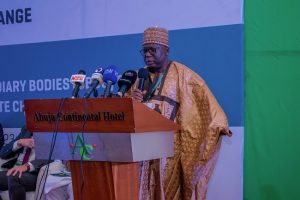“Nigeria relies heavily on oil, which contributes to an uncertain political environment for implementing diverse environmental incentives conducive to voluntary carbon markets. Furthermore, commercial availability of carbon credits and liquidity might depend on global and dynamic environmental conditions.”

Nigeria is developing a plan to create a $2.5 billion carbon market. The purpose of this market is to encourage investments, reduce emissions, and promote sustainable growth in Nigeria. A special committee has been appointed to draft a comprehensive plan for activating the carbon market. It is led by Dr. Zacch Adedeji, Chairman of the Federal Inland Revenue Service.
The plan is expected to include an emissions trading scheme, a carbon registry, and a framework for high-integrity carbon credits, aligned with the African Carbon Market Initiative. The blueprint also involves a focus on using natural gas as a transitional fuel while investing in renewable energy sources. The ultimate goal is to enable Nigeria to participate significantly in the mandatory and voluntary carbon markets, opening doors to substantial climate finance.
First and foremost, we need to understand that the oil economy in Nigeria is a major obstacle to the development of a carbon market in the country. The Nigerian economy is heavily dependent on oil and gas, which will discourage the development of a carbon market. One of the main reasons for this is the fact that the government is reliant on revenues from oil and gas for its budget. This reliance makes it difficult for the government to prioritise environmental protection and sustainable development, which are key components of a carbon market.
Second, a comprehensive and clear policy and framework needs to be established for a successful and transparent carbon market. Currently, there are no universally agreed standards for carbon emissions accounting, offset mechanisms, or accreditation requirements between different jurisdictions, further complicating coordinated efforts to control global warming efficiently.
Nigeria will have to develop her own methodologies for measuring and reporting greenhouse gas emissions and establishing additional carbon markets to facilitate the exchange of units. One recommended approach is international cooperation under Clause 6 of the Paris Agreement to facilitate emissions reductions.
Furthermore, a lack of knowledge or lack of awareness about carbon markets among stakeholders can hamper their effectiveness. To create a functional carbon market, potential investors and sellers need to understand the fundamentals of this market so they can meaningfully engage and transact.
Finally, an accurate data gathering system is essential for tracking, verifying, and validating carbon emissions data. A 2019, study revealed that most Nigerian manufacturing companies are silent on environmental information disclosure. Without reliable data and appropriate monitoring processes, tracking emissions will be difficult, which would hamper business’ ability to participate in the carbon market, and meet their targets.
Realistically assessing potential obstacles is important when moving toward the implementation phase. Engaging constructively with national and international partners will ultimately determine the success or failure of the initiative by enabling resilient integration amid uncertainty.
By Greatson Odion
